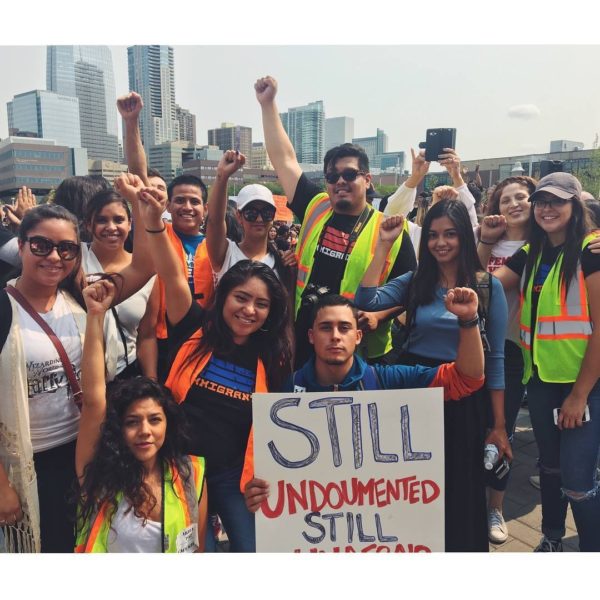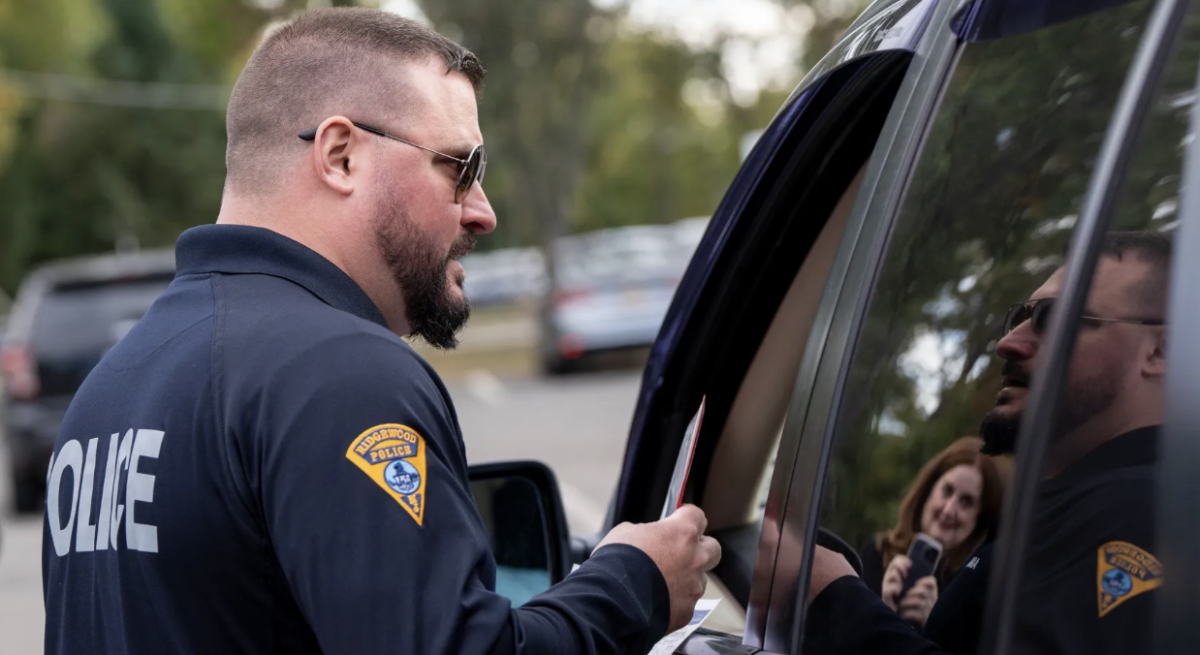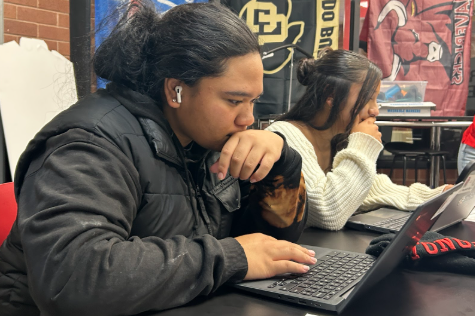Feature Photo Provided by: Maria Rangel – Maria Rangel and others stand together in a march in solidarity for DACA. The march took place at the Civic Center on September 6th.
They are known as Dreamers: people who came to the United States in search of perhaps a new life, money, or education. About 788,000 people, according to the U.S Immigration Services, were protected under the Deferred Action for Childhood Arrivals (DACA), which was first introduced by President Obama in 2012.
On Tuesday, September 5th, President Donald Trump passed a law to backhold DACA, meaning that after September 5th, no new DACA applications would be accepted. People that already have DACA have the chance to renew it until October 5th. What does this mean?
“Luckily I was able to apply before October 5th,” stated DACA recipient Emmanuel Navarro, an alumni of Rangeview. “Right from the start [DACA] benefitted me. From being able to work, to buying my own car and now owning my own house.”
Those who have been DACA recipients were able to work and attend school under protection from deportation. The following were the requirements of to be eligible for DACA:
- Are under 31 years of age as of June 15, 2012;
- Came to the U.S. while under the age of 16;
- Have continuously resided in the U.S. from June 15, 2007 to the present.
- Entered the U.S. without inspection or fell out of lawful visa status before June 15, 2012;
- Were physically present in the United States on June 15, 2012, and at the time of making the request for consideration of deferred action with USCIS;
- Are currently in school, have graduated from high school, have obtained a GED, or have been honorably discharged from the Coast Guard or armed forces;
- Have not been convicted of a felony offense, a significant misdemeanor, or more than three misdemeanors of any kind; and
- Do not pose a threat to national security or public safety.
After Trump’s decision to rescind the program, those 788,000 people are now at a risk of getting deported if they do not renew by October 5th, in addition to the 11 million undocumented immigrants.

College Track’s college completion advisor and the Secretary for the Keeping the Dream Alive Conference, Jeanette Rojas states, “unless you are African American and were brought here as part of the slavery diaspora or identify as Native American, this was you three generations ago. And it makes me sad that history is so quick to forget that.”
States all over the nation have stood in solidarity by providing protection and support for DACA. In Colorado, for example, U.S. Representative Mike Coffman, is expected to come forward with a “Hail Mary Maneuver” that would prevent the deportation of any immigrant enrolled under DACA for three years.
Colorado has also joined other states in the suing of Trump’s dismantling of DACA. The lawsuit is being led by New York, Washington state, and Massachusetts. Colorado Governor John Hickenlooper was said to join this lawsuit because not only was Trump’s decision “outrageous,” but because it risks the futures of more than 17,000 Coloradans.
Senator Cory Gardner is a co-sponsor for a legislation called “Dream Act 2017.” On July 20th, 2017, Senator Lindsey Graham introduced S. 1615. According to Gardner, this act allows a select group of young immigrants to not only contribute to the US, but also have a safe path for citizenship. S. 1615 has been referred to the Senate Judiciary Committee for further review
“I believe that we need to have a legislative solution to fix our broken immigration system,” Gardner wrote in an e-mail to The Raider Review. “The Dream Act would ensure law-abiding Dreamers, who were brought here by no fault of their own, certainty and permit them to live in this country that they all home.”
Individual organizations in Colorado have offered their own support to the community. Rangeview’s own College Track hosted a Community Support Day from 9 AM to 4 PM on Saturday September 23rd. The workshop provided a chance for families to help make an emergency plan in case of deportation, according to Rojas.
“What a family preparedness plan does is it says, ‘no these are the people who will help be in charge of the medical component, this is where the bills are paid, this is the budget, there are the emergency contacts…’ So that’s something we are doing for our families and community,” commented Rojas.
Though there may still be a chance that DACA recipients are not able to renew their permits, there are still other opportunities to be able to get a working permit and/or residency. Although the process is longer and more complicated, it is still a backup plan. It is important to check in with local representatives and organizations, such as the Bethany Immigration Services, to search for other options.
Senior Denisse Miranda is a DACA recipient herself.
“I came at the age of two, and I received DACA this past May,” she said.
Miranda is another affected by Trump’s repeal. With DACA, she is not only able to work, but she is also able to pay in-state tuition if qualified. While Miranda is only one student, there are thousands more in Aurora alone whose lives could be turned upside down by the DACA decision.
But although the future of the Obama-era DACA program is not secure, there is still hope among many Dreamers.
“I believe that immigration is beautiful,” Rojas said. “I believe that sacrificing everything that you know to be home for others is beautiful and powerful. I want the parents of DACAmented people to know that they are not criminals and that they did not make a bad choice.”






